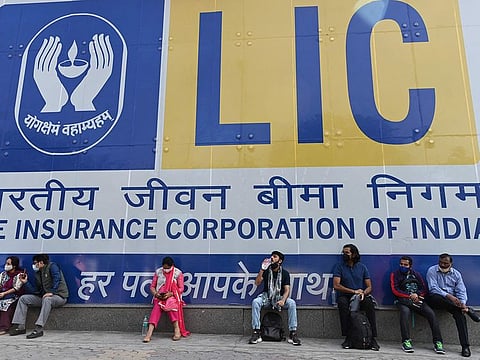India slashes size of LIC IPO, targets $2.7 billion windfall
Adverse market conditions force government to trim stake sale from 5% to 3.5%

Mumbai: India has slashed the size of an initial public offering by insurance giant LIC but the share issue will still be the country’s largest to date, with a targeted windfall of $2.7 billion, regulatory filings showed on Wednesday.
Prime Minister Narendra Modi’s government is desperate for proceeds from the IPO by Life Insurance Corporation of India and the sale of other state assets to help fix tattered public finances.
The long-awaited IPO - originally slated for March - will open next week, after the government chose to wait out recent market volatility triggered by the Russian attack on Ukraine, the filing seen by AFP showed.
But the adverse market conditions did force the government to substantially cut its stake sale from an earlier five per cent to 3.5 per cent.
The government will sell 221 million shares within a price band of Rs902-949, the prospectus showed.
This implies an IPO size of between Rs200-210 billion ($2.61 billion to $2.74 billion), overtaking that of payments firm Paytm, which raised $2.5 billion in November in India’s largest public share sale to date.
The offer values LIC at Rs6 trillion ($78 billion), and follows a years-long exercise by bankers and bureaucrats to appraise the mammoth insurer and ready it for listing.
Founded in 1956 by nationalising and combining 245 insurers, LIC was for decades synonymous with life insurance in post-independence India, until the entry of private companies in 2000.
It continues to lead the pack with a 61 per cent share of the life insurance market in a country of 1.4 billion people, with its army of 1.3 million “LIC agents” giving it huge reach, especially in rural India.
LIC’s market share has, however, declined steadily in the face of competition from net-savvy private insurers offering specialised products.
The firm warned in its regulatory filing that “there can be no assurance that our corporation will not lose further market share” to private companies.
The insurer is also India’s largest asset manager, with Rs39.55 trillion under management as of September 30, including significant stakes in Indian blue chips like Reliance and Infosys.
The government hopes LIC’s IPO will attract legions of first-time investors to the stock market, in a country where less than five percent of people have trading accounts.
It will be a crucial step in Modi’s policy to “monetise and modernise” state-run companies and plug an estimated Rs16.6 trillion fiscal deficit this financial year.
In the last financial year, ending March 31, the government missed its privatisation goal for the third straight year, raising Rs135.61 billion - only eight percent of its original divestment target.



